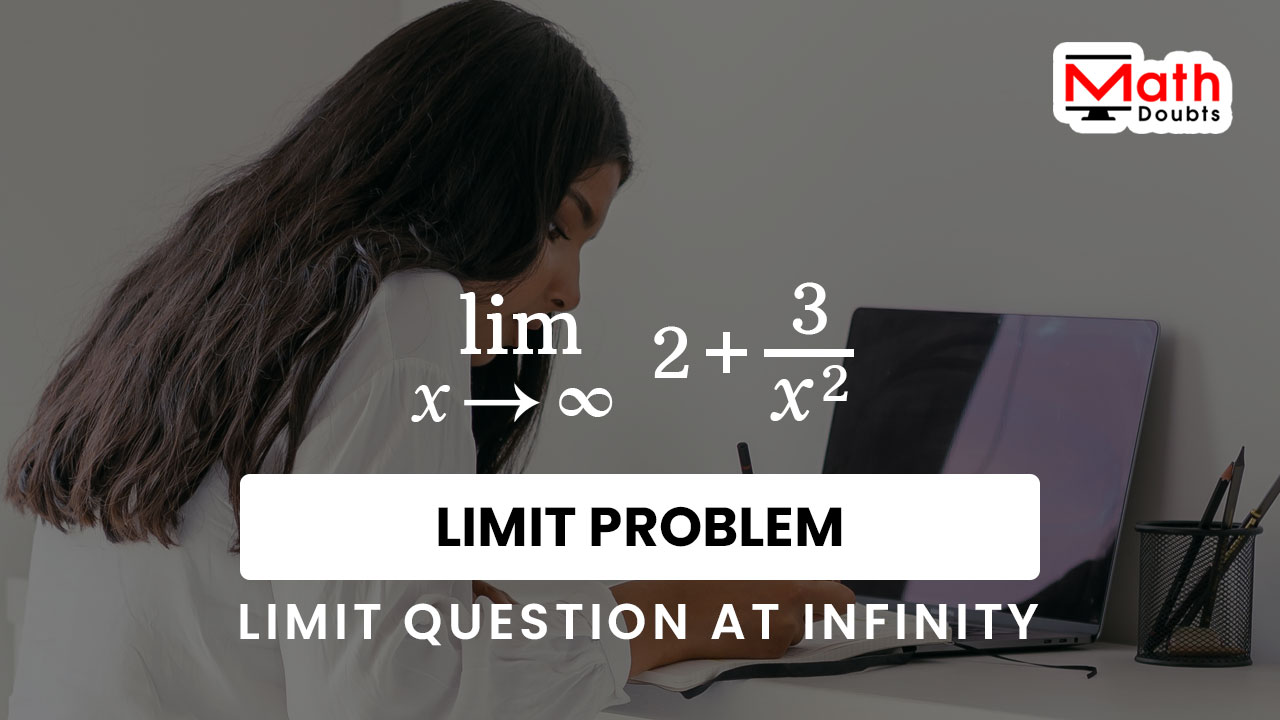Evaluate $\displaystyle \large \lim_{x\,\to\,\infty}{\normalsize \bigg(2+\dfrac{3}{x^2}\bigg)}$

The limit of $2$ plus $3$ divided by $x$ square should be evaluated as the value of $x$ approaches infinity in this limit question. So, let’s learn how to find the limit of two plus three divided by square of $x$ as the value of $x$ tends to infinity.
Find the Limit of sum of two functions
The given algebraic function is formed by the addition of a constant function $2$ and an algebraic function $3$ divided by square of $x$. The limit of sum of the two functions $2$ and $3$ divided by $x$ square can be evaluated by finding the limits of them as per the sum rule of the limits.
$=\,\,$ $\displaystyle \large \lim_{x\,\to\,\infty}{\normalsize 2}$ $+$ $\displaystyle \large \lim_{x\,\to\,\infty}{\normalsize \bigg(\dfrac{3}{x^2}\bigg)}$
Evaluate the Limits of the functions
Let’s first evaluate the limit of constant function $2$ as the value of $x$ approaches infinity by using the limit rule of a constant.
$=\,\,$ $2$ $+$ $\displaystyle \large \lim_{x\,\to\,\infty}{\normalsize \bigg(\dfrac{3}{x^2}\bigg)}$
Now, it is time to focus on finding the limit of the $3$ divided by $x$ square. Firstly, let’s try to split the rational function as a product of two fractions.
$=\,\,$ $2$ $+$ $\displaystyle \large \lim_{x\,\to\,\infty}{\normalsize \bigg(\dfrac{3 \times 1}{x^2}\bigg)}$
$=\,\,$ $2$ $+$ $\displaystyle \large \lim_{x\,\to\,\infty}{\normalsize \bigg(3 \times \dfrac{1}{x^2}\bigg)}$
The number $3$ is a coefficient of the reciprocal of $x$ square. So, it can be released from the limit operation as per the constant multiple rule of the limits.
$=\,\,$ $2$ $+$ $3 \times \displaystyle \large \lim_{x\,\to\,\infty}{\normalsize \bigg(\dfrac{1}{x^2}\bigg)}$
The reciprocal of $x$ square can be written as the square of the reciprocal of variable $x$ by the power of a quotient rule.
$=\,\,$ $2$ $+$ $3 \times \displaystyle \large \lim_{x\,\to\,\infty}{\normalsize \bigg(\dfrac{1 \times 1}{x^2}\bigg)}$
$=\,\,$ $2$ $+$ $3 \times \displaystyle \large \lim_{x\,\to\,\infty}{\normalsize \bigg(\dfrac{1^2}{x^2}\bigg)}$
$=\,\,$ $2$ $+$ $3 \times \displaystyle \large \lim_{x\,\to\,\infty}{\normalsize \bigg(\dfrac{1}{x}\bigg)^2}$
Now, the power rule of limits should be used to find the limit of square of the multiplicative inverse of $x$ by the square of the limit of the reciprocal of $x$.
$=\,\,$ $2$ $+$ $3 \times \bigg(\displaystyle \large \lim_{x\,\to\,\infty}{\normalsize \dfrac{1}{x}\bigg)^2}$
According to the limit rule at infinity, the limit of the reciprocal of $x$ as the $x$ approaches infinity is equal to zero.
$=\,\,$ $2$ $+$ $3 \times (0)^2$
Find Limit by simplifying the expression
The limit of $2$ plus $3$ divided by $x$ square as $x$ tends to infinity, is obtained in the form of an arithmetic expression and it should be simplified to get the limit. So, let us concentrate on simplifying the arithmetic expression.
$=\,\,$ $2$ $+$ $3 \times 0^2$
$=\,\,$ $2$ $+$ $3 \times 0$
$=\,\,$ $2$ $+$ $0$
$=\,\,$ $2$
